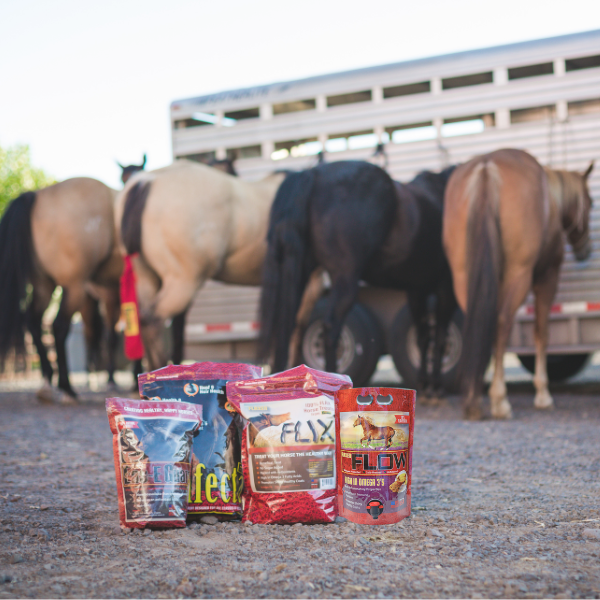Omega-3 fatty acids are a type of essential amino acid that plays an important role in your horse’s health. The optimum diet aims for more Omega-3 fatty acids than Omega-6 fatty acids. While they are found in many foods, few of these foods have the right ratio of Omega-3s and other nutrients to support your horse’s needs. Horse Guard makes two products designed to provide these important nutrients.
- Flaxen Flow - Nitrogen-protected Flaxseed oil supplement.
- Flaxen Flix - Healthy horse treats made from 100% Flaxseed.
Both of these have higher Omega-3 content. You get the benefits of Omega-3s plus the wonderful coat shine from the pure oils that carry the Omega-3s. In this article, we look at the benefits of Omega-3s for horses and how you can best supply them to your horse.
What are Omega-3 Fatty Acids?
Omega-3 Fatty Acids are “essential oils”, which means they must be consumed because the body cannot produce them on its own. Omega-3s have many health benefits. Omega-3 fatty acids are the most powerful type of fatty acids capable of reducing oxidative stress and inflammation. Omega-3 fats support disease resistance, improve disposition, and support joint health. Omega-3 fatty acids also help prevent dry skin and dull coats and help keep healthy body weight. The two most common sources of Omega-3 fatty acids are marine based fish and flaxseed.
Why Are Omega-3s Important for Horses?
A healthy supply of Omega-3 fatty acids has so many benefits for horses. Omega-3s act as an antioxidant. Antioxidants are the WD 40 of the body. Selenium is another important antioxidant that can boost your immune system and protect against certain cancers and heart disease in humans. It is also a natural mood enhancer and stress reducer. We've had many customers testify that when they corrected their selenium deficiency and fed flaxseed oil, their horses became much less reactive and more even tempered. These two important antioxidants can make a huge health difference in your animals.
Omega-3s vs. Omega-6s for Horses
The optimal Omega-3 to Omega-6 ratio is 1:1 of the total diet. The whole diet needs to be considered when it comes to evaluating Omega fatty acids. The reason why we want the diet to be higher in omega-3 fatty acids rather than a straight 1:1 ratio is because the rest of the diet is usually higher in omega-6 fatty acids. When your horse eats hay they are usually consuming more omega-6 fatty acids which is throwing off the omega-3 to omega-6 ratio. In addition, concentrates typically fed in the US, like oats, barley, rice bran, and soybeans, are higher in omega-6 fatty acids. Feeding a flax supplement helps offset a diet high in omega-6 fatty acids.
How to Provide Your Horse with Omega-3 Fatty Acids – The packaging and process is important

A horse’s feed is naturally the best way to supply him with Omega-3 fatty acids. Feeding Flaxseed or Flax oil are the natural solutions to the challenge.
Horse Guard's Flow is the most concentrated and protected Omega-3s that you can buy. Unlike many "Flax" oil products on the market, it contains 100% Flaxseed oil. It is important to read the label because many of the other "Flax" oil products contain 50% soybean oil. It is cheaper and has higher levels of Omega 6s which can increase inflammation.
The Packaging Protects
Flow is packaged in a red plastic pouch. When we package it we “nitrogen flush” the bag. This means that the oxygen has been flushed out of the flask which is never opened during feeding. The oil is released out a push button spout so the oil is never in contact with oxygen which "oxidizes" the oil and makes it rancid losing its Omega-3 potency. When flaxseed oil is packaged in a bottle it is exposed to oxygen as soon as it is opened even if the oxygen was flushed out.
Which horses benefit from Omega-3s the most?
If you have the resources, time, and money, every one of your horses should get Flaxseed oil....just like all people would benefit from this healthy essential oil. Young and old, healthy and vibrant, or sick and weak all can use the oil that lubricates and preserves. If you have performance horses or you just want to give your old friend a healthy boost, all horses benefit. But when horses are in recovery from disease, injury, or stress they can gain extra benefit by reducing inflammation and increasing disease resistance. Our flaxseed oil can also be used for horse’s with whom require added calories, as it is very calorie dense and can be fed up to a cup. Omega-3 Fatty acids have also been shown to help aid in glucose metabolism and reduce blood sugar spikes in metabolic horses.
The Bottom Line
Horses are herbivores, which means that they naturally get their fat from plant sources. If you want to give your horse the best health benefits, you should provide them with a diet that has been supplemented with Omega-3 fatty acids. Ideas for sources of Omega-3s include
- Flix - The healthy horse treat which is 100% Flax Cake
- Flow - 100% Flaxseed oil, which is cold pressed and nitrogen protected.
If you take extra good care of your horses, a good supply of Omega-3s in your horse’s diet will help their heart, joints, and hooves, promote shiny coats, and protect them against disease and other health threats.








Leave a comment (all fields required)